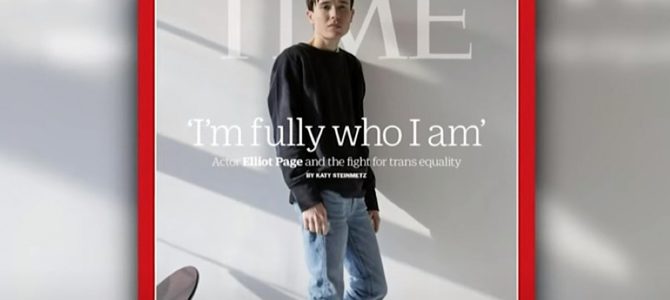
Rather than advocate for taking time to fully understand who you want to be or addressing the long and careful journey most transgender people undergo, Elliot Page appears to be the model for rapid-onset gender dysphoria with almost instantaneous positive media reactions after transitioning within a few short weeks.
On Dec. 1, 2020, Ellen Page, star of “The Umbrella Academy,” declared herself “Elliot” Page. Nine weeks later, the announcement came that Page would be divorcing wife Emma Portner after three years.
Then, seven weeks later, on Mar. 16, 2021, Page graced the cover of Time magazine announcing the success of a top surgery — an elective double mastectomy — and declaring of the procedure, “It has completely transformed my life.” While much of this may have been ongoing in the background, at least to the public view this has been a rapid and dramatic change.
Several other things make this turn of events troubling. An adolescent or teenage girl struggling with gender dysphoria or simply not conforming to typical feminine stereotypes will look to Page and believe she only needs to announce to the world her new identity and in a moment’s time all of her anxieties, insecurities, and problems will vanish. She’ll be able to step out into the world as her new, “true” self.
Very few people, however, are willing to provide the genuine, hard, truth of this journey, its real-world consequences, or even of the likelihood of changing one’s mind later.
Page told Time that back in December she predicted “a lot of support and love and a massive amount of hatred and transphobia.” While the article positioned concerns about transgender body mutilation as hateful “vitriol” and stereotypical ignorance, Page was widely celebrated. As GLAAD took the opportunity to point out — along with the article and most reporting on the issue — Page is being positioned as a reluctant hero fighting against rightwing hatred and ignorance.
Just as the current legal battles over medical intervention for gender dysphoria in children and minors and protecting girls’ sports have nothing to do with bigotry towards transgender people, concerns about the rapid change from Ellen to Elliot is not an attack on the Page as an individual at all. Indeed, when Ellen announced she was now “he” and would be going by “Elliot,” within hours, every mainstream reference to the actor changed: suddenly the young girl who starred in “Juno” was labeled a young man named Elliot.
Huffington Post editorial director Noah Michelson celebrated:
So many people say and think so many awful things about trans people because they don’t know any trans people, so they know nothing about what it means to be trans. The more people like @TheElliotPage can tell their stories and the more we listen, the better things will become.
GLAAD, an LGBT advocacy organization, also championed the announcement saying:
Not only is Elliot Page a fine actor, he is also an advocate for equality and justice who continues to educate the world about who trans people really are and about why the current barrage of anti-trans bills promoted by fearmongering politicians are so harmful and unnecessary.
Yet many were astonished and concerned with how instantaneously the corporate media world reacted to affirm Page’s new identity, without question or hesitation. Many also wondered about Page’s thought process in making the decision.
Page had come out as gay in 2014. She said, “I am tired of hiding and I am tired of lying by omission,” declaring, “I suffered for years because I was scared to be out. My spirit suffered, my mental health suffered, and my relationships suffered. And I’m standing here today, with all of you, on the other side of all that pain.”
At the time she joked about how tabloid magazines loved to point out her masculine style, which she dismissed by saying she just preferred to be comfortable. She argued gender stereotypes “serve no one,” adding, “There are pervasive stereotypes about masculinity and femininity that define how we’re all supposed to act, dress and speak.”
After announcing her breast amputation, Page argued, “People cling to these firm ideas [about gender] because it makes people feel safe. But if we could just celebrate all the wonderful complexities of people, the world would be such a better place.” But Page’s actions tell a story of drastic changes of personality, identity, and plastic surgery to conform to a specific gender and sex norm.
So for many, seeing Page posing like an awkward teenage boy, fully embracing strict gender stereotypes, seems like a sudden and odd change. Page told Time, however, that she knew she was trans at age nine when she was allowed to cut her hair, explaining, “I felt like a boy … I wanted to be a boy. I would ask my mom if I could be someday.”
Page’s personal journey is not really in question or a concern. As an adult, you are free to make big changes and redefine yourself as you please. If medically changing one’s body and adopting a new identity is what brings Page happiness, then there is really nothing to discuss. If so, I and many others are happy for Page.
There is a legitimate concern, however, about the overall messaging of her transition and how LGBT media and left-wing activists exploit this general tolerance to bully for more aggressive and extreme politics. Page now says this has been a lifelong challenge of differing degrees. Formerly identifying as a lesbian, now Page identifies to Time as nonbinary and queer, with an identity that is an “ongoing process.”
But the rest of us saw a successful, happily married lesbian icon unexpectedly announce she is transgender, quickly file for divorce, and undergo top surgery shortly after. For the audience of young people Page claims to want to help, the entire transition happened in the blink of an eye.
It’s not as simple as picking out a new style of clothing and a nickname. It’s more than cutting your hair short. Medical intervention has permanent and life-altering implications that must be carefully understood by an adult mind capable of consenting to the risks involved.
The belief that personal fulfillment and happiness can only be achieved by hiding sex-specific characteristics and adopting the stereotypes of the opposite sex is deeply disturbing. Presenting all of this to kids as though it’s as simple as Page made it appear is downright dangerous.









